Class 6 Science Notes Chapter 2 Components of Food
Food: It is the group of edible substances which provide energy to the living beings and repair the old tissues and build the new tissues.
Nutrition: The process of consuming nutrients required for the growth and development of our body and to obtain energy is known as nutrition.Our food contains three main substances called nutrients. These are fats, proteins and carbohydrates. In addition, our body requires water, salts (minerals), vitamins and fibres.
Diet: It is the amount of food eaten by a person at a time.
Malnutrition: If a person does not get adequate food, or if his/her diet does not contain all the nutrients, he or she becomes weak. When the body does not get adequate nutrition, it is said to be suffering from malnutrition.
Various food components are grouped in three classes:
- Energy giving food: Carbohydrates and fats.
- Bodybuilding food: Proteins.
- Protective food: Vitamins and minerals.
Carbohydrates
- Grains such as rice, wheat, sorghum, peas, beans, sago (sabudana), sugarcane, sugar beet, many fruits like banana, mango and melons and vegetables are good sources of carbohydrates.
- Cellulose, starch, sucrose, glucose and fructose are the important carbohydrates found in our food.
- Starch turns iodine solution to dark blue or black.
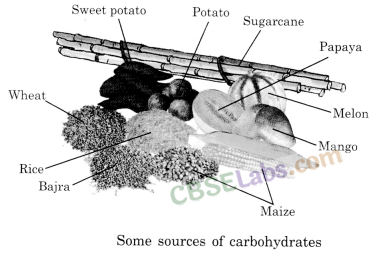
Fats
- Fats are obtained either from plants or from animals. Groundnut oil, soybean oil and mustard oil are examples of fats derived from plants. Fats like butter and ghee are obtained from animals.
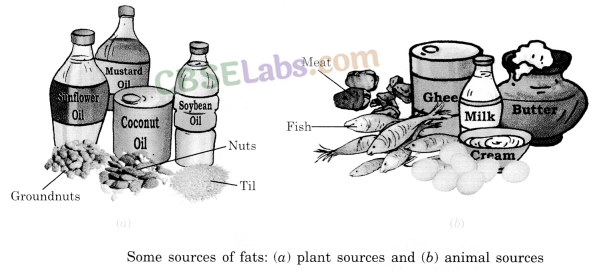
- Fats act as fuel in our body but they provide more energy than carbohydrates. (in) Our body has some advantages of fat deposits in small quantity. It helps body organs to grow and protects them from injury and prevents loss of heat from the body surface.
- Too much fat deposition is harmful for the body. This leads to the condition called obesity.
- Fatty substances leave greasy and transparent spot on paper.
Proteins
- Milk, fish, meat, cheese and eggs are the main sources of animal proteins. Vegetable proteins can be obtained from legumes including pulses and beans.
- Proteins are required for growth and repairing of our body. They help in building new tissues. They also account for tough, fibrous nature of hair and nails and for the structure of muscles. They are a part of our blood and help in proper functioning of our body.
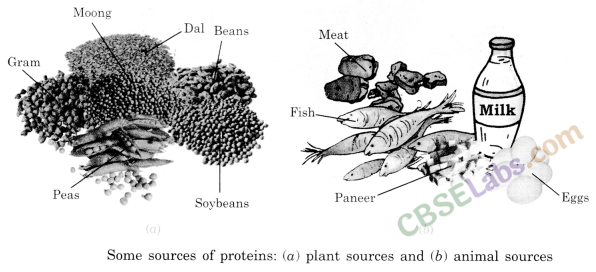
- Large amount of protein is needed for building new tissues in short period, such as during infancy, pregnancy or when mother is nourishing a child.
Vitamins: Vitamins are required by our body in very small quantities. Vitamins help in keeping our eyes, bones, teeth and gums healthy. The food items rich in vitamins are called protective food as they protect our body from diseases and keep us healthy.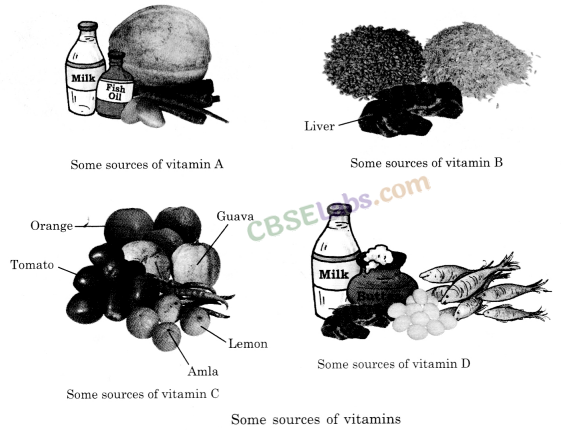
Minerals: Minerals are needed by our body in small amounts. Each one is essential for proper growth of body and to maintain good health. Some sources of minerals are shown in fig.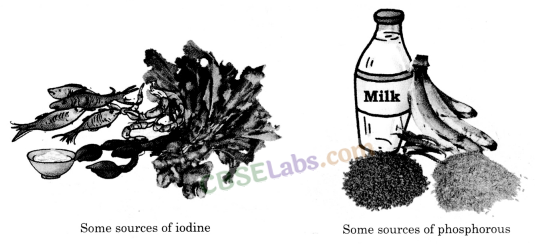
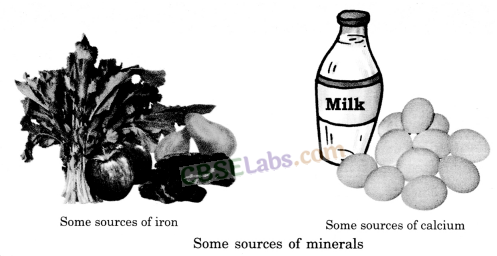
Water
- Our body requires a large quantity (5-7 litre) of water daily.
- Water helps our body to perform many functions like digestion, throwing out dissolved waste as urine and impure blood.
- Water also keeps our body cool through sweating.
- Water helps in blood circulation.
Roughage
- Whole grains, flour and cereals, potatoes, fresh food, raw and cooked vegetables provide roughage to our food.
- It helps in proper digestion of food and prevents constipation.
Food items that are deep fried and roasted usually lose their nutritive value. Energy requirement: Requirement of energy or intake of food depends on profession, age, sex and special needs like pregnancy, infancy, lactation, etc. Deficiency diseases: Diseases that occur due to the lack of nutrients are called deficiency diseases. Some of them are listed in the following Table 2.1.
Some Diseases or Disorders Caused by deficiency of Vitamins and Minerals
| Name of vitamins and minerals | Deficiency disease or disorder | Main symptoms |
| Vitamin A | Night blindness | Poor or loss of vision in darkness (night), sometimes complete loss of vision |
| Vitamin B1 | Beriberi | Weak muscles, and very little energy to work |
| Vitamin C | Scurvy | Bleeding gums |
| Vitamin D | Rickets | Bones become soft and bent |
| Calcium | Hypocalcemia | Weak bones, tooth decay |
| Iodine | Goitre | Glands in the neck appear swollen, mental disability in children |
| Iron | Anaemia | Weakness |
Balanced diet: A diet containing all the nutrients and other components in proper proportions is called a balanced diet.
Beriberi: It is a disease caused due to the deficiency of Vitamin Br The muscles of Beriberi victim get weak.
Carbohydrates: Carbohydrates are the energy giving nutrients. The main carbohydrates found in our food are in the form of starch and sugar.
Energy: Energy is the capacity to do work. We need energy for our various activities.
Fats: Fats act as fuels in our body. They are obtained either from animals or from plants.
Minerals: Minerals are needed by our body in small quantities. All of them are essential for proper growth of the body and to maintain good health.
Nutrients: The components of food that are necessary for growth and development of our body are called nutrients.
Proteins: Proteins are required for growth and repairing of tissues in our body. They help in building new tissues.
Roughage: Dietary fibres are called roughage. They are mainly provided by plant products in our food.
Scurvy: Scurvy is caused due to the deficiency of vitamin C. Bleeding gums is its main symptom.
Starch: Starch is a kind of carbohydrate.
Vitamins: Vitamins are also an important nutrient. Deficiency of any vitamin causes deficiency diseases.
Food is essential for all animals, including human beings. The food that we eat contains different components.
Look at the picture of food items given below. Write the names of components of food that you think are present in the food items. Write your answers in the spaces provided.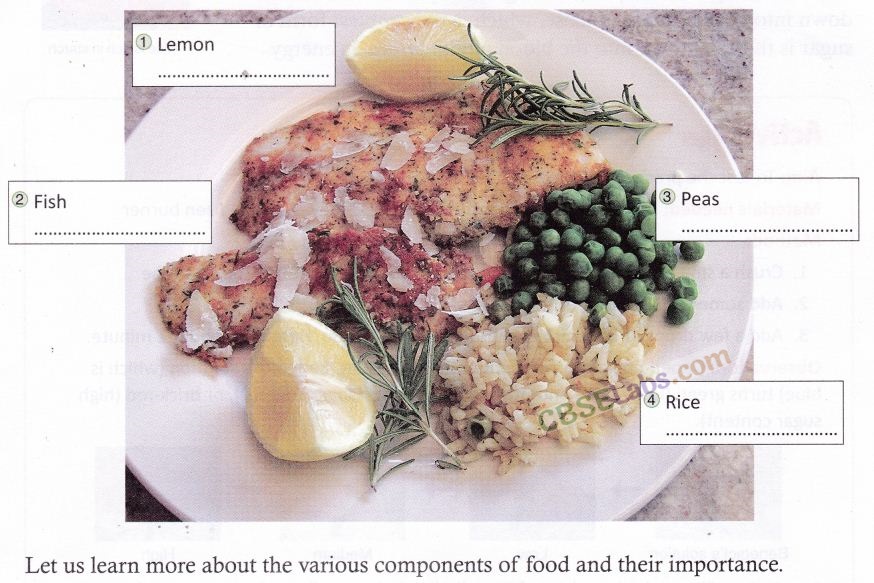
Let us learn more about the various components of food and their importance. 1.Vitamins , 2.proteins, 3.proteins, 4.carbohydrates.
Components Of Food:
The food that we eat consists of different components or nutrients. Nutrients are substances that are needed by our body for proper growth and healthy body function. There are six main components present in food: carbohydrates, fats, proteins, vitamins, minerals, and roughage or dietary fibres. These nutrients fulfill different needs of the body.
Carbohydrates:
Carbohydrates provide energy to your body, which keeps it going throughout the day. There are two major types of carbohydrates in food: sugar and starch.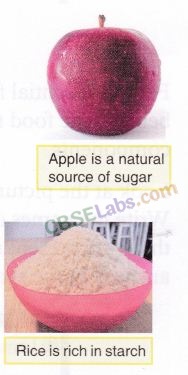
Sugars: Sugar is also called simple carbohydrate. Fruits, honey, and table sugar are some sources of sugar.
Starch: Starch is also called complex carbohydrate. Plants store energy in the form of starch. Rice, wheat, corn, potato, and bread are some sources of starch. When we eat plant products, containing sugar and starch, our digestive system breaks them down into glucose. This glucose, which is the simplest form of sugar is then absorbed into the blood and provides us energy.
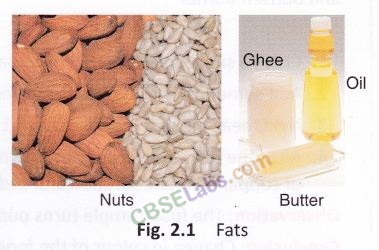
Proteins:
Proteins are needed by our body for muscle¬building and repairing worn-out tissues. Our muscles, organs, and even blood are made up of mostly proteins. If we do not eat proteins, our body will not be able to repair damaged cells, or build new ones. Proteins in our diet come from both animal and plant sources (Fig.2.2).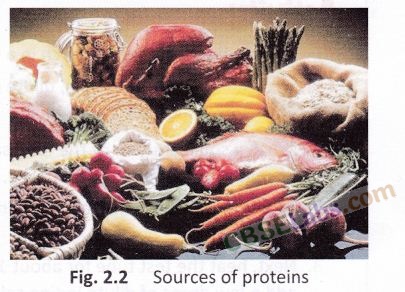
Meat, fish, egg, and milk are some animal sources of proteins. Pulses, soyabeans, grams, and nuts are some plant sources of proteins.
Vitamins:
Vitamins are needed for the proper functioning of our body. They help in keeping our eyes, bones, teeth, and gums healthy. There are 13 vitamins, each of which has a specific function. Vitamins are of two types: fat-soluble and water-soluble.
Fat-soluble vitamins Vitamins A, D, E, and K are fat-soluble vitamins. These are stored in the fat tissues of our body and are used only when the body needs them.
Our body prepares vitamin D in the presence of sunlight.
Water-soluble vitamins Vitamins Bl, B2, B3, B6, B12, and folic acid (together known as vitamin B complex) and vitamin C are water-soluble vitamins. Since water-soluble vitamins are not stored in the body, these need to be regularly supplied through food items like citrus fruits, spinach, and other green leafy vegetables, etc. Lack of vitamins in the body can cause deficiency diseases.
Minerals:
Just like vitamins, minerals also help our body to stay healthy. Minerals perform important functions like formation of bones, teeth, and blood cells and helps in maintaining a normal heartbeat. Minerals are of two types: macrominerals and trace minerals (Fig. 2.3).
Macrominerals {macro: large) are needed by the body in larger amounts as compared to trace minerals. Calcium, magnesium, sodium, and potassium are examples of macrominerals.
Trace minerals are needed by the body in very small amounts. Iron, zinc, copper, and iodine are examples of trace minerals.
Roughage or Dietary Fibres:
The portion of the plant food that do not provide any nutrients to our body but help in maintaining a healthy digestive system is called roughage or dietary fibres (Fig. 2.4).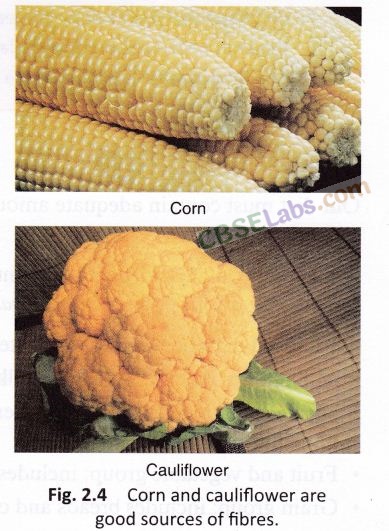
Roughage are of two types: soluble and insoluble. Soluble roughage are soluble in water whereas insoluble roughage are not. Apple, strawberry, peach, and rice are examples of food items rich in soluble roughage that help in blood circulation. Whole grain, carrot, cabbage, turnip, and cauliflower are examples of food items rich in insoluble roughage. Lack of insoluble roughage in the diet causes the stool to become hard and difficult to pass. This condition is called constipation.
Water:
Almost 70% of our body weight is water. Water is needed by our body for good health.
- It helps to transport substances inside our body.
- It helps our body to absorb nutrients from food.
- It helps to regulate our body temperature.
- It is needed for various chemical reactions that take place inside our body during digestion, excretion, etc.
We get water not only from the liquids we drink but also from the food we eat. Milk, fruits, vegetables, and juices are good sources of water.
Balanced Diet:
Our diet must contain adequate amount of different nutrients for our body to function properly.
A diet that contains adequate amount of different nutrients required for the healthy functioning of our body is called a balanced diet.
A balanced diet must include food items from the following four food groups.
- Milk group: includes milk and milk products
- Meat group: includes meat (chicken, fish, lamb, etc.) and meat substitutes (beans, peas, nuts, and seeds)
- Fruit and vegetable group: includes fruits and vegetables
- Grain group: includes breads and cereals.
Deficiency Diseases:
Lack of carbohydrates, proteins, vitamins, or minerals in the diet can cause diseases. Diseases that are caused due to the lack of nutrients in the diet are called deficiency diseases. Deficiency diseases cannot be transmitted from one person to another.
Deficiency of Carbohydrates:
Carbohydrates are the main energy sources. Lack of carbohydrates in the diet results in lack of energy and stamina. A labourer who does hard manual work needs more carbohydrates in his diet than a person who does his work sitting in his office.
Deficiency of Proteins:
Growing children need more proteins in their diet. Lack of proteins in the diet weakens muscles.
Deficiency of proteins leads to a disease called kwashiorkor (fig. 2.5). Deficiency of proteins along with carbohydrate deficiency is called Protein Energy Malnutrition (PEM). It leads to marasmus. These diseases are more common in children of rural areas.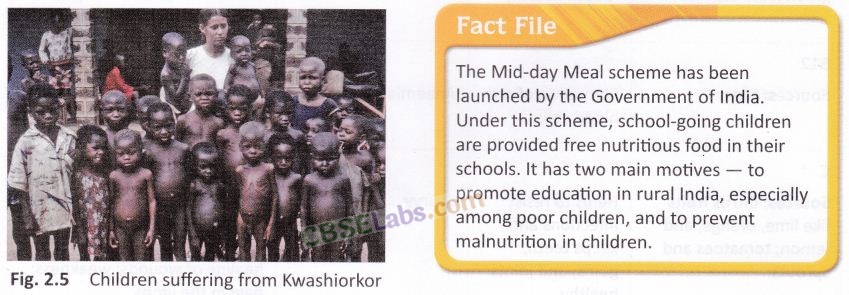
A child suffering from kwashiorkor has some or all of the following symptoms: large pot-like belly, stunted growth, swelling of face and limbs (especially the feet), skin diseases, mental retardation, and diarrhoea. If the treatment is started in time, improving protein intake may correct this disease.
Marasmus is more common among infants and children under 5 years of age. A child suffering from marasmus becomes very thin, shows slow body growth, lack of energy, loss of appetite, weak legs, mental retardation, poor muscle development, etc.
To prevent these diseases, the Government of India has started programmes like the Integrated Child Development Scheme (ICDS) and the Mid-day Meal scheme in schools.
Deficiency of Vitamins:
Table 2.1 lists some important vitamins and their sources, functions, deficiency diseases, and symptoms.
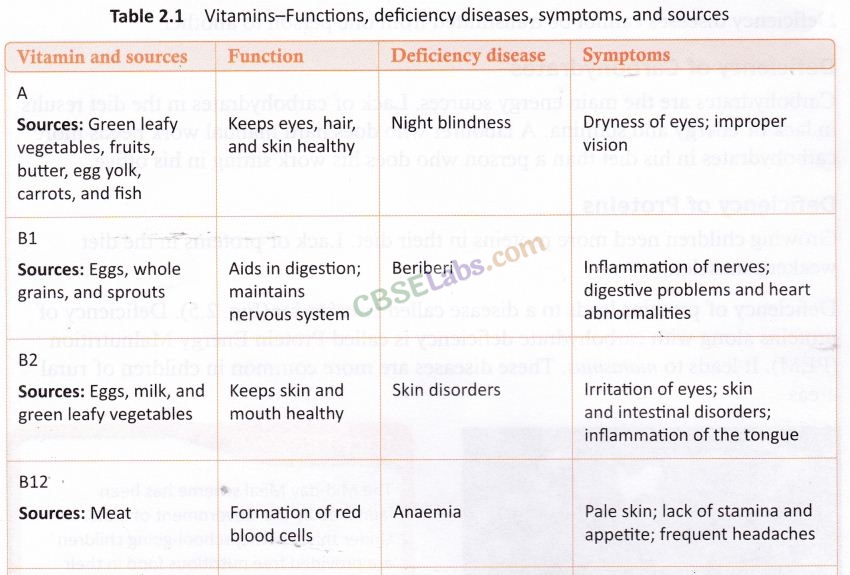
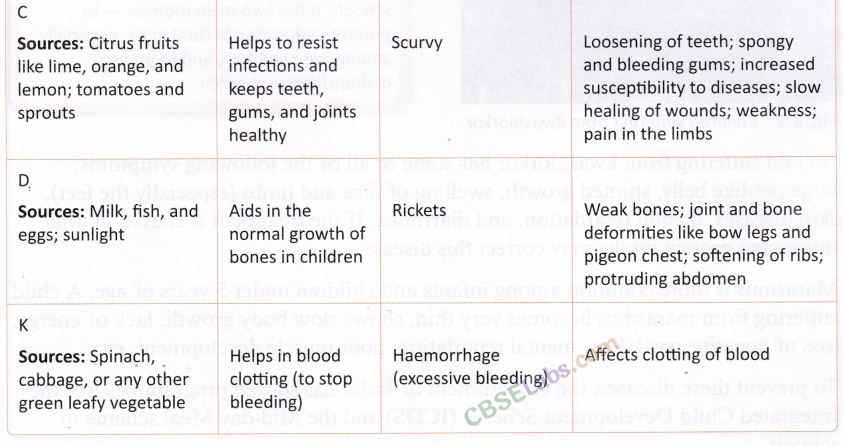
Some vitamins are very sensitive to heat and light. For example, vitamin C is easily
destroyed during cooking. Therefore, vitamin C-rich food items should be eaten raw.
Scurvy was common among sailors in ancient times. Due to lack of cure, several sailors died of this disease during long voyages. In the 18th century, James Lind found that eating citrus fruits reduced the occurrence of scurvy in sailors.
Deficiency of Minerals:
Table 2.2 lists some important minerals and their sources, functions, deficiency diseases, and symptoms. Minerals also assist in certain chemical reactions in the body. Cooking does not destroy them.
Table 2.2 Minerals-Functions, deficiency diseases, symptoms, and sources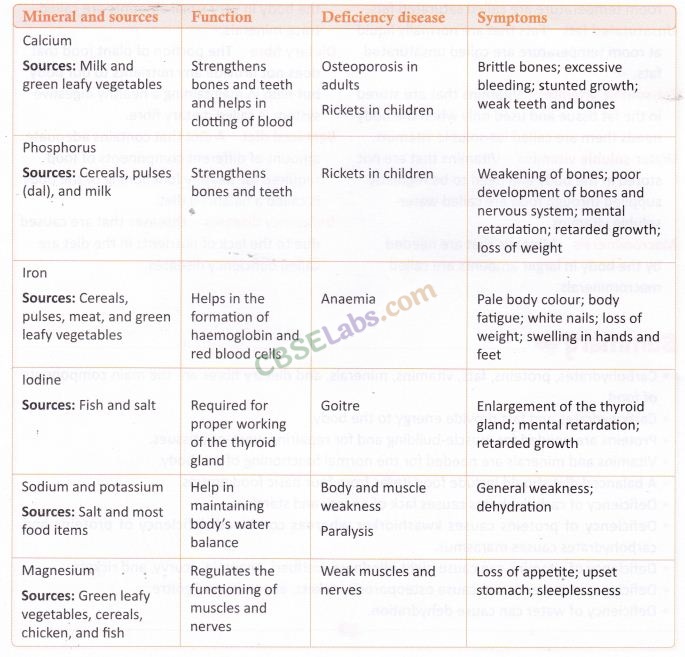
Deficiency of Water in the Body:
Water is very essential for proper functioning of our body. Excess loss of water from the body leads to a condition called dehydration.
Dehydration causes loss of salts and leads to weakness in the body. Oral Rehydrating Solution (ORS) can be given to the patient to recover from dehydration. It is available free of cost at primary health centres. It can also be made at home by mixing 8 teaspoons of sugar and 1 teaspoon of salt in 1 litre of clean, drinking water.
Saturated fats Fats that are normally solid at room temperature are called saturated fats.
Unsaturated fats Fats that are normally liquid at room temperature are called unsaturated fats.
Fat-soluble vitamins Vitamins that are stored in the fat tissue and used only when the body needs them are called fat-soluble vitamins.
Water-soluble vitamins Vitamins that are not stored in the body and need to be regularly supplied through food are called water- soluble vitamins.
Macrominerals Minerals that are needed by the body in larger amounts are called macrominerals.
Trace minerals Minerals that are needed by the body in very small amounts are called trace minerals.
Dietary fibre The portion of plant food that does not provide any nutrients to our body but help in maintaining a healthy digestive system is called dietary fibre.
Balanced diet A diet that contains adequate amount of different components of food required for healthy functioning of the body is called a balanced diet.
Deficiency diseases Diseases that are caused due to the lack of nutrients in the diet are called deficiency diseases.
Carbohydrates, proteins, fats, vitamins, minerals, and dietary fibres are the main components of food.
Carbohydrates and fats provide energy to the body.
Proteins are needed for muscle-building and for repairing worn-out tissues.
Vitamins and minerals are needed for the normal functioning of our body.
A balanced diet should include food items from four basic food groups.
Deficiency of carbohydrates causes lack of energy and stamina.
Deficiency of proteins causes kwashiorkor whereas combined deficiency of proteins and carbohydrates causes marasmus.
Deficiency of vitamins can cause night blindness, beriberi, anaemia, scurvy, and rickets.
Deficiency of water can cause dehydration.
Deficiency of minerals can cause osteoporosis, rickets, anaemia, and goitre.



0 Comments